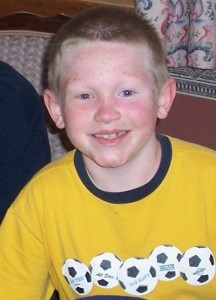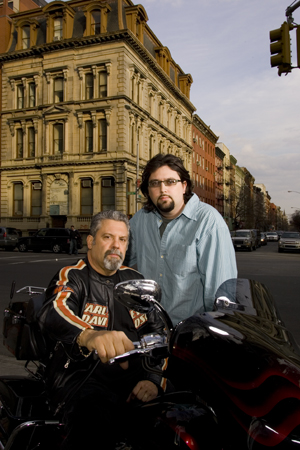Caleb’s Promise: A Father’s Day Tribute and a Dilemma for 24 Million Children
 “If you knew me, you would know my Father also." – Jesus (John 8:19, NIV)
The scene was gory and tragic, every father’s worst nightmare. The mini-van carrying Matt Stevens’ two oldest sons had flipped on a gravel strewn country road and ten-year-old Caleb was thrown underneath the wreckage. Big brother Josh, himself just eleven, comforted “Cub†by encouraging him to hold on until dad arrived.
Giant Slayers
The Stevens family, Matt and Katy and their four boys, were in the midst of a summer of service, traveling to four cities from the Mid-Atlantic to New England with six interns and another family for Chain Reaction mission trips. That fateful morning of August 5, 2005, they were on the back end of a retreat in Western Maryland, near the West Virginia border, preparing to lead forty youths in compassion ministry in downtown Baltimore.
Matt arrived at Cub’s side as he slipped into and out of consciousness. Cradling his son in his arms, Matt told him it was okay to go home to Jesus. Cub closed his eyes, gasped seven more times, and breathed his last.
Something happened on the way from that roadside to the gravesite. Hundreds of lives touched by a ten-year-old came from eleven states to celebrate the legacy of a giant slayer in the tradition of his Biblical namesake. It’s a tradition that had previously been passed on to me from my own father just as Caleb had learned it from his.
Father Harley
Â
“If you knew me, you would know my Father also." – Jesus (John 8:19, NIV)
The scene was gory and tragic, every father’s worst nightmare. The mini-van carrying Matt Stevens’ two oldest sons had flipped on a gravel strewn country road and ten-year-old Caleb was thrown underneath the wreckage. Big brother Josh, himself just eleven, comforted “Cub†by encouraging him to hold on until dad arrived.
Giant Slayers
The Stevens family, Matt and Katy and their four boys, were in the midst of a summer of service, traveling to four cities from the Mid-Atlantic to New England with six interns and another family for Chain Reaction mission trips. That fateful morning of August 5, 2005, they were on the back end of a retreat in Western Maryland, near the West Virginia border, preparing to lead forty youths in compassion ministry in downtown Baltimore.
Matt arrived at Cub’s side as he slipped into and out of consciousness. Cradling his son in his arms, Matt told him it was okay to go home to Jesus. Cub closed his eyes, gasped seven more times, and breathed his last.
Something happened on the way from that roadside to the gravesite. Hundreds of lives touched by a ten-year-old came from eleven states to celebrate the legacy of a giant slayer in the tradition of his Biblical namesake. It’s a tradition that had previously been passed on to me from my own father just as Caleb had learned it from his.
Father Harley
Â
 Before firefighters at Ground Zero started calling Rick Del Rio “Father Harley†and a national magazine called him “Not Your Grandmother’s Pastor†(Charisma, April 2004), I called him Dad.
Prior to 9/11, Pastor Rick was known in local evangelical circles as an unconventional street preacher turned church planter who had traded business suits for tank-tops to minister among drug dealers and the homeless in Manhattan’s Lower East Side (LES). His appearance at times seemed thuggish; his manner, gruff. Fearless, he’d been known to get in a face or two. His tattoos and earrings made him least likely to be taken for a reverend, even without weaving between traffic on his Harley Ultra-Glide.
At first glance then, my father is not the clergyman one would expect to provide onsite spiritual comfort at the scene of the most devastating terrorist attack on our nation’s soil. But first glances can be misleading, as he filled that role following FDNY Chaplain Mychal Judge’s death at the World Trade Center. When the second plane hit the instinct to go where the need is greatest compelled him to drive his motorcycle to the scene. Immediately upon his arrival, minutes after the second tower collapsed, rescue workers asked him to bless a body bag filled with body parts.
Running towards Ground Zero was in character for Pastor Rick. Nearly 20 years earlier, in 1982, the young businessman and his wife Arlene were called into evangelistic ministry. A literal interpretation of Romans 5:20 – “Where sin abounds, grace abounds much more†– drew them to a neighborhood that the NYPD identified as among the most dangerous in New York. Dad’s theory: find the worst drug spots and go there, because an abundance of drugs meant an abundance of sin and by extension, if Scripture is true, God’s Abounding Grace.
He lived this conviction and modeled for my two younger brothers and me how to follow his lead. My parents initiated their sons, between 3 and 8 years old, to urban ministry at a street meeting in a park then regarded as a drug supermarket. About 30 yards away, a drug deal went bad and a man got stabbed. Undeterred, we accompanied them again the following week.
“Give Me This Mountainâ€
A year or two later, when I was no older than Caleb Stevens, Dad preached “Give Me This Mountain†at a stodgy old Park Avenue church. I don’t remember many of Dad’s sermons from back then, but this one captured my heart. He talked about Old Testament Caleb, an eighty-five year old fighter determined to receive a promise he had held onto for forty-five years, even though it meant contending with giants.
The message stuck mainly because I have watched Dad practice what he preached, not merely as an observer, but as an active participant walking with him along his journey. What a journey we’ve shared, one filled with mountains, valleys, and lots of hostile, would-be giants. The occasional mishap and frequent missteps pale next to the joy he now receives watching all three of his grown sons (and two grandsons, so far) serving in urban ministry.
Â
Children become who their dads make them.
Children are more than repositories for dad’s DNA. We become who our fathers make us. It’s a sobering truth that Jesus put this way: “If you knew me, you would know my father also.â€Â He further explained: “I tell you the truth, the Son can do nothing by himself; he can do only what he sees his Father doing, because whatever the Father does the Son also does†(John 5:19, NIV).
Caleb Stevens spent his last twenty-four hours leading the Chain Reaction interns in random acts of kindness; delivering food door-to-door in a Cumberland county mining community; and offering his father a hot cup of coffee just hours before the accident. This was not exceptional. My own earliest memories of Caleb are as a freckle-faced eight-year old with an uncanny resemblance to Opie running around a lower Manhattan housing project picking up trash just because it was a nice thing to do; or when he would offer to clean up after a roomful of teenagers finished lunch or to watch my toddler son so I could run an errand or to carry someone else’s luggage twice his size.
Before firefighters at Ground Zero started calling Rick Del Rio “Father Harley†and a national magazine called him “Not Your Grandmother’s Pastor†(Charisma, April 2004), I called him Dad.
Prior to 9/11, Pastor Rick was known in local evangelical circles as an unconventional street preacher turned church planter who had traded business suits for tank-tops to minister among drug dealers and the homeless in Manhattan’s Lower East Side (LES). His appearance at times seemed thuggish; his manner, gruff. Fearless, he’d been known to get in a face or two. His tattoos and earrings made him least likely to be taken for a reverend, even without weaving between traffic on his Harley Ultra-Glide.
At first glance then, my father is not the clergyman one would expect to provide onsite spiritual comfort at the scene of the most devastating terrorist attack on our nation’s soil. But first glances can be misleading, as he filled that role following FDNY Chaplain Mychal Judge’s death at the World Trade Center. When the second plane hit the instinct to go where the need is greatest compelled him to drive his motorcycle to the scene. Immediately upon his arrival, minutes after the second tower collapsed, rescue workers asked him to bless a body bag filled with body parts.
Running towards Ground Zero was in character for Pastor Rick. Nearly 20 years earlier, in 1982, the young businessman and his wife Arlene were called into evangelistic ministry. A literal interpretation of Romans 5:20 – “Where sin abounds, grace abounds much more†– drew them to a neighborhood that the NYPD identified as among the most dangerous in New York. Dad’s theory: find the worst drug spots and go there, because an abundance of drugs meant an abundance of sin and by extension, if Scripture is true, God’s Abounding Grace.
He lived this conviction and modeled for my two younger brothers and me how to follow his lead. My parents initiated their sons, between 3 and 8 years old, to urban ministry at a street meeting in a park then regarded as a drug supermarket. About 30 yards away, a drug deal went bad and a man got stabbed. Undeterred, we accompanied them again the following week.
“Give Me This Mountainâ€
A year or two later, when I was no older than Caleb Stevens, Dad preached “Give Me This Mountain†at a stodgy old Park Avenue church. I don’t remember many of Dad’s sermons from back then, but this one captured my heart. He talked about Old Testament Caleb, an eighty-five year old fighter determined to receive a promise he had held onto for forty-five years, even though it meant contending with giants.
The message stuck mainly because I have watched Dad practice what he preached, not merely as an observer, but as an active participant walking with him along his journey. What a journey we’ve shared, one filled with mountains, valleys, and lots of hostile, would-be giants. The occasional mishap and frequent missteps pale next to the joy he now receives watching all three of his grown sons (and two grandsons, so far) serving in urban ministry.
Â
Children become who their dads make them.
Children are more than repositories for dad’s DNA. We become who our fathers make us. It’s a sobering truth that Jesus put this way: “If you knew me, you would know my father also.â€Â He further explained: “I tell you the truth, the Son can do nothing by himself; he can do only what he sees his Father doing, because whatever the Father does the Son also does†(John 5:19, NIV).
Caleb Stevens spent his last twenty-four hours leading the Chain Reaction interns in random acts of kindness; delivering food door-to-door in a Cumberland county mining community; and offering his father a hot cup of coffee just hours before the accident. This was not exceptional. My own earliest memories of Caleb are as a freckle-faced eight-year old with an uncanny resemblance to Opie running around a lower Manhattan housing project picking up trash just because it was a nice thing to do; or when he would offer to clean up after a roomful of teenagers finished lunch or to watch my toddler son so I could run an errand or to carry someone else’s luggage twice his size.
 [An entry from 10-year-old Caleb's journal.]
[An entry from 10-year-old Caleb's journal.]
- Funny. He loved to laugh and make others laugh. He never took himself too seriously.
- Faith. He lived according to a can-do attitude straight out of Philippians 4:13.
- First. He always raced to be the first at everything, including opportunities to serve.
- Fruit. His life produced something worth passing on.

 Welcome to the professional website and personal weblog of Jeremy Del Rio. Whether you're a client, friend, or curious onlooker, please don't stay a spectator. Engage the conversation. Your contributions matter here.
Welcome to the professional website and personal weblog of Jeremy Del Rio. Whether you're a client, friend, or curious onlooker, please don't stay a spectator. Engage the conversation. Your contributions matter here.

















